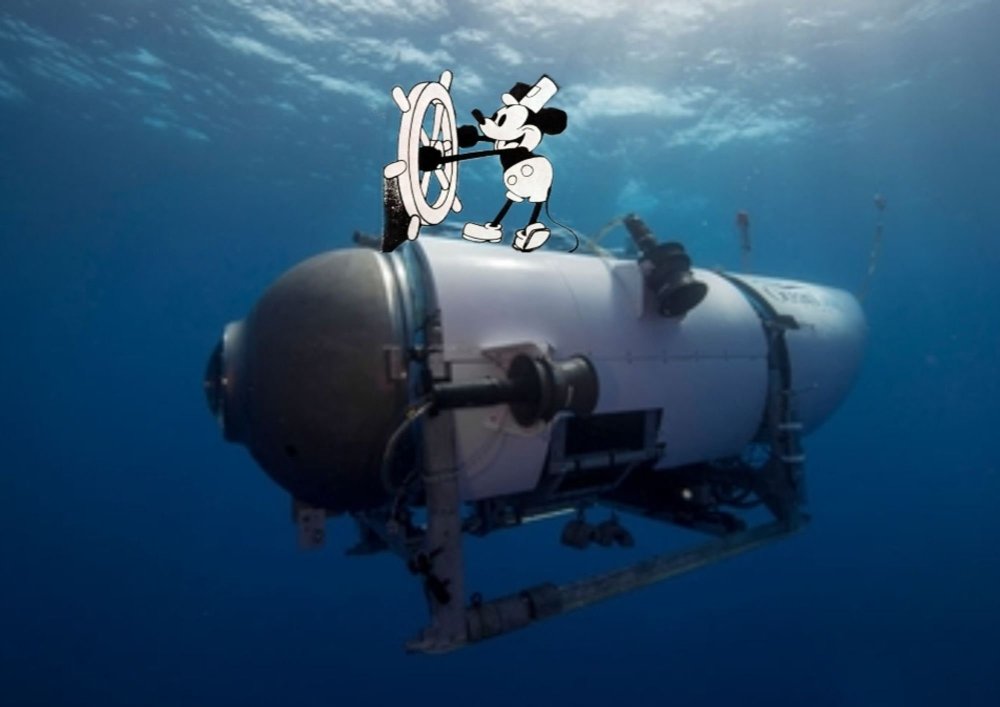Leaderboard
Popular Content
Showing content with the highest reputation since 04/24/23 in all areas
-
6 points
-
I asked our benevolent overlord Dave about the ad settings, and apparently Google AdSense enabled "vignette" ads without asking us. He's turned them off now. Hopefully that's the end of the issue and they don't find another more irritating thing to turn on.5 points
-
From a different perspective, it appeared you were badgering a newbie, @Benjamin Karl, who was not making a claim but rather requesting opinions on the claims made in a video. Whose points he courteously summarized when asked to. While he could be encouraged to dig deeper for other sources, I am not sure that your tone was that of a friendly guide in that quest.5 points
-
This is sad news. He was one of the great philosophers of our time. He belongs to one of the most science oriented philosophers and one of the most honest thinkers I have known during my philosophy study. He didn't spare anybody with too naive ideas, be it materialistic or dualistic, but he always was kind, never attacking people personally, but critical reflecting on their ideas. He was able to show that it is possible to have a theory of consciousness, without leaving a physicalist ontological stance. Many people thought that his book 'Consciousness Explained', should have been titled 'Consciousness Explained Away', but I certainly do not agree with that. Consciousness exists, but it can be explained. Same for free will. He could explain how a personal and societal relevant concept of free will can go perfectly together with determinism, where others keep sticking to either 'magical free will', or denying free will altogether. In his broader ideas, he was an atheist and humanist. I do not know much about his personal life, but at least I know he also knew how to enjoy the pleasant sides of life. Enjoyer of (red?) wine, making his own cidre, harvesting the apples himself. I remember I once saw a video, where he was sitting on his tractor. I think he lived a very fulfilled life. We should all be glad that he lived his life as he did. I will miss the many new ideas he could still have found, even in his higher age. A loss for the philosophical world and many other people who are, and might still be, inspired by his thinking.4 points
-
4 points
-
I agree. The political right and maga-class has been getting beyond ridiculous in ostracizing people who refuse to tow the party line and repeat the lies, casting out anyone deemed to be "others." It demands a level of purity nobody can ever maintain, and it's pretty sad that their views can't hold up to even remedial scrutiny.4 points
-
The solution is for people who are not themselves autistic, and who evidently don’t understand what autism even means, to stop proposing “solutions”. I am autistic, and I am not a problem that needs to be solved.4 points
-
Wow, so much to unravel here. Yes. The scientific background was in the open. So it would be just a matter of time. And then the point Swansont mentioned: That is true, more or less. But Japan simply did not capitulate. So the war could have taken much longer, taking many lives of American soldiers. Yes, but only after Germany was defeated. Heisenberg was in charge. The infamous meeting between Heisenberg and Bohr in 1941, gave the latter the impression that the Nazis were making serious work of the atomic bomb, and brought this impression to the US. Yep. I have seen the 'atom cellar' in Haigerloch: Does not quite compare to Los Alamos, is it? I would not put my hand in the fire for this, but it surely was a reason: Truman said something like this about the Soviets and the atomic bomb: "Now we have a real hammer on those boys". Another reason might have been to have a 'real live test'. A hint for this is the second bomb. One of the A-bombs was a U-235, the other a plutonium bomb. Wouldn't it be interesting to compare their effects 'in the field'? About the capitulation of Japan: there was a struggle between the civilian government and the military. The government wanted to give up, the military wanted to fight until the bitter end. One of the struggling points was the position of the emperor. The US wanted an unconditional capitulation, the Japanese government found that the position of the emperor could not be discussed. In the end the Japanese government made a very unusual proposal: let the emperor decide. In the meantime the first atomic bomb was dropped. If this fact had an influence on the decision of Hirohito is not known, fact is that he chose to capitulate. His speech in which he called for the capitulation was recorded, to be brought to the Japanese radio studios. Radical militaries tried to steal the recording on its way to the radio station, but they did not succeed. Hirohito's speech was broadcasted, and Japan capitulated. And the US more or less let the emperor untouched. Had the US made it known that the emperor could stay earlier, Japan might also have capitulated earlier. Maybe the A-bombs would not have been necessary. Main source: Bert Röling, who was a.o. member of the International Military Tribunal for the Far East (also called the Tokyo Tribunal, similar to the Nürnberg Tribunal in Germany). Hmmm. Lise Meitner and Otto Frisch were hardly Nazis, they were Jewish and fled Germany in 1938. Otto Hahn: Fritz Strassmann: So four of the 'main characters' were definitely not Nazis. Equating 'German' and 'Nazi' is simply wrong, also during WWII.4 points
-
4 points
-
“what makes this fee revolutionary is that it will apply to emissions that don’t happen on European soil. The EU already puts a price on many of the emissions created by European firms; now, through the new Carbon Border Adjustment Mechanism, or CBAM, the bloc will charge companies that import the targeted products — cement, aluminum, electricity, fertilizer, hydrogen, iron and steel — into the EU, no matter where in the world those products are made.” https://knowablemagazine.org/content/article/food-environment/2024/big-boost-europe-carbon-neutral-goals-cbam This removes incentives to move carbon-intensive industry out of the EU, since that won’t sidestep tariffs any longer. The tariff accounting includes the electricity used for production, so there’s an incentive for business exporting to the EU to use green energy4 points
-
The CEO of IKEA is now the Prime Minister of Sweden. He is currently assembling his cabinet.4 points
-
45 years ago President Carter has helped me to escape from the USSR.4 points
-
4 points
-
Alkonoklazt has been suspended for a week because staff would like a break from all the rebellion against the system.4 points
-
Perhaps we can dispense with the notion that he’s a genius, and stop paying attention to his nonsensical ramblings.4 points
-
4 points
-
4 points
-
Identity is about who we are and how we identify ourselves to others. I could tell you I identify as a father, and while I could share pictures of me with my kids or submit to a paternity test to meet your arbitrarily high threshold in the name of science, most commonly we simply accept my statement as true since it’s ME telling YOU how I identify MYSELF. Likewise, I might identify as a baseball fan. I could produce tickets to the games I’ve attended and post all the games I’ve watched on TV in the past year and even all the times I’ve participated out on the diamond with friends, but most commonly my saying “I identify as a baseball fan” is sufficient based on my say so alone. You don’t ask to test it and submit it for peer review. Perhaps I was born in Russia then later moved to Germany. I could show you my passport and citizenship papers, but if I tell you I now identify as German, that really ought to be enough no matter how much you love the motherland and hate that I’ve defected. Perhaps I was given the name John at birth, and now tell you I instead identify myself as Bruce or Loretta. You don’t get to tell me I’m not allowed to do that like some entitled overseeing brat. And on and on and on ad infinitum … I could identify as a reader, or an audiophile, or as an art lover, or a car collector, or a weapons expert and cigar aficionado, a brewer, a builder, a lover of memes… and you wouldn’t sit here demanding that I produce scientific evidence to support these. It’s about ME telling YOU how I identify MYSELF, and you don’t get to tell me I’m wrong no matter how forcefully you disagree with the identity of myself I’ve expressed. It’s simply not your place. End program. Do not pass Go, do not collect $200. YOU have no say in anything related to MY identity, and gender identity is obviously no different.4 points
-
4 points
-
https://www.telegraph.co.uk/obituaries/2024/04/19/daniel-dennett-philosopher-atheist-darwinist/ Daniel Dennett, the American philosopher, who has died aged 82, was, with Richard Dawkins, a leading proponent of Darwinism and one of the most virulent controversialists on the academic circuit. Dennett argued that everything has to be understood in terms of natural processes, and that terms such as “intelligence”, “free will”, “consciousness” “justice”, the “soul” or the “self” describe phenomena which can be explained in terms of physical processes and not the exercise of some disembodied or metaphysical power. How such processes operate he regarded as an empirical question, to be answered by looking at neuroanatomy – the engineering involved in brains. Darwinism, to Dennett, was the grand unifying principle that explains how the simplest of organisms developed into human beings who can theorise about the sorts of creatures we are. In Consciousness Explained (1991), he argued that the term “consciousness” merely describes “dispositions to behave” and the idea of the “self” was nothing more than a “narrative centre of gravity”. In Darwin’s Dangerous Idea (1995) he went further than any other philosopher or biologist in arguing that the whole of nature, including all individual human and social behaviour, is underpinned by a Darwinian “algorithm” – a single arithmetical, computational procedure. Borrowing Richard Dawkins’s notion of “memes” (“bytes” of transferable cultural ideas encompassing anything from a belief in God to an individual’s fashion tastes), Dennett argued that the Darwinian algorithm also explained, for example, the musical genius of JS Bach, whose brain “was exquisitely designed as a programme for composing music”. Dennett’s philosophy undercut any idea of teleology or “purposive” creation....3 points
-
A few things should be added to lay the foundation for further discussions. First gonochorism (the term to describe a sexual system where there are male and female members) does not always have to be linked to sexual dimorphism (the term to describe differences in appearance between male and females of a species). Sexual dimorphism is often a consequence of the respective reproductive strategies. Among hermaphroditic species, one can actually also distinguish between various forms. The one OP is thinking about is considered simultaneous hermaphroditism, i.e. all individuals producing sperm and eggs, but there are also species who are sequential hermaphrodites. I.e. producing egg or sperm at different points in their life. Studies trying to figure out fitness benefits have been investigating closely related species in which all three strategies are found, e.g. in certain worms. Here, it was found that the different species had different reproductive characteristics, that likely have benefits under different conditions. Generally, they found a trade-off between fecundity (how much they reproduce) and survival. Simultaneous hermaphrodites had the highest survival rate, but least fecundity (and smallest eggs, indicative of lower maternal investment), whereas the opposite was found for sequential hermaphrodites. The gonochoristic species was somewhere in-between. Taking that all together (survival rate, reproduction over total life cycle etc.) it seemed that the dichoristic species had overall the highest fitness. They had higher fecundity in the early stages of life cycle. They outperform simultaneous hermaphrodites, which have lower fecundity. While sequential hermaphrodites are more fecund, they are delayed until their female phase, and during the whole life cycle they are not able to compensate the early advantage. Essentially they are able to reach sexual maturity faster, likely as they only need to produce one form of gametes. The disadvantage of that gonochoristic species pay is that they produce males, that cost the same as females (as eggs) but do not directly contribute to future generations (the limiting factors are the eggs). Hermaphroditism is speculated to be a primary advantage when population densities are low and it is difficult to find a mate. There are also evolutionary developmental consideration. Transition from hermaphrodite to gonochoristic species is comparatively easy, as it could be reasonably executed by suppressing the development of one sexual function. Conversely, there are more steps involved in transition from gonochorism to hermaphroditism. I.e. once gonochorism outcompetes hermaphroditism in the evolutionary history of species, it is very unlikely that they hermaphroditism will develop, even if it became more advantageous.3 points
-
3 points
-
It only takes generations when one of those generations is unwilling to change. Pick any three major progressive changes and if you can avoid the obstructionists, things will move quickly. Offhand, I'd allow ranked-choice voting, just so we can break with the two parties that only represent corporations, and get some actual citizen representation going. I'd also nationalize something major, like food production, so healthy food was a right rather than something you have to earn. And my fave right now is to expand the USPS to compete with Amazon, including a vendor portal so small businesses aren't smothered. People who have no food insecurities and access to the means to prosperity aren't as likely to have lots of kids. Same goes for folks who are better educated, so a focus there can only help with overpopulation. We really need to stop supporting the industries that spend money to spin fear because we spend more when we're afraid and frustrated.3 points
-
This thread is already way too personal, and I'd prefer we focus less on the individual. I'll try to be better at this myself, but we all need to remain focused on the positions and merit of the information being shared. Let's be clear: Many of Alkon's points are entirely valid. Much of what he shares contains very good and useful information. Likewise, some of what I've shared has been somewhat weak. This is all true, and so is the fact that he clearly has a strong interest in this topic and obviously allocates much of his time learning about it. That's exactly what we ALL should be doing... learning, growing, understanding and I applaud him for it. I just cannot personally join him in that final leap where he keeps making absolute comments about what will and will not be possible in the future, or where he dismisses things based solely on a rigid framing of terms or the quite limited technologies which are most familiar and most hyped today (or those being discussed on LinkedIn, for example). Nobody has a crystal ball, and nobody should IMO argue in the manner he has by starting with formalized rigid unbending structures and preconceived conclusions. We can make any logic work if we put all data into rigid potentially inaccurate semantic boxes and I see a lot of that here. If that works for him, then great! But it doesn't work for me, nor I propose does it work for most people who are scientifically minded (I believe he may be more philosopher than empiricist, but that's not intended as either a judgement or sleight, just a general observation). The technology in this space is changing at an incredible pace. It is equally being amplified by parallel technologies in processing power and capabilities. There are literally tens of thousands of seriously brilliant engineers working on this every single minute of every single day, and my core position here is that we must be EXTREMELY cautious and avoid making broad sweeping proclamations and predictions with any illusions of certainty. We must temper our confidence. What's potentially worse here is that we barely have workable definitions of consciousness and unconsciousness, the actual topic of the central claims made in the OP... so any assertions about what does and does not fit into those ill-defined ever-evolving categories strike me as specious, at best. Anyway... enough personal bullshit, yeah? This is an interesting topic that's fun to explore if we can please be civil with one another (and yes... the same reminder applies equally to me).3 points
-
3 points
-
It is not a contradiction, it just isn't compatible with the Newtonian model of time and space. And at its heart, Relativity uses a completely different model for these. In Relativity these measurements are not absolute but frame dependent. An analogy would be these images of two lines: The same set of lines, just viewed from different perspectives. In the first image the red line is "taller" than the green, and in the bottom image the green line is "taller" than the red. The point being that in Relativity, time and space are measured more like the "height" of the lines in the images and not by their absolute length.3 points
-
As a note for anyone who may stumble upon this post in the future: This is something I wrote when I really didn't understand much about science and I was also ignorant about a lot of other things. Unfortunately its one of the things that first pops up when I search my name, and its honestly really embarrassing that this exists out there, but unfortunately this forum doesn't delete posts, so all I can do is attach a comment to express my discontent with my silly past self.3 points
-
I wonder if there is a language difficulty because you seem to be asking questions (which is good) rather than trying to preach. But I would say that you are posting too much at once. So I am going to start with the first part of your post and begin to answer these questions. Then we can see how we go. So the Moon orbits the Earthonce every 27.3 days which makes it angular speed of 2π / (27.3 x24) radians per hour. This is approximately 0.01 rads/hr.. (It will become clear why I am using these units) The Earth also rotates at an angular speed of 2π/24 radians per hour Which is approximately 0.26 rads/hr. Since both rotations are in the same direction the net rotational difference is their difference or 0.26 - 0.01 = 0.25 rads/hr. The radius of the Earth is 6731 kilometres. So if a static bulge is to keep up with the moon is must travel at 6731 x 0.25 km per hour. This agrees with your calculation. A wave travelling at this speed is the basis of the simple dynamic theory. But this theory is only applicable within the following constraints. If the depth of the water is d in km then waves of wavelength L will propagate witha velocity of v = √(gL/2π) for waves in deep water. Where g is the acceleration due to gravity in km/hr2 which is 127008 km/hr2 This makes the wavelength as (1600*1600*2π) / 127008 or 127 km. However this formulae is only valid for d/L greater than 0.5. Now the average depth of the ocean is around 3.6 km and tha max depth is only 11 km (NOAA) So dl << 0.5 and the condition is not satisfied for the deep water formulae. Which makes the ocean too shallow for a simple resonant system. So instead we must use the shallow water which then includes the effect of the bottom and other topography. The formula for such waves is given by v = √(gd) Which is good to around (1600 * 1600) /127008 km Which is approximately 20km. This emans that the wave equation is no longer homogenous (equal to zero in this case) There is now a forcing term involved as well and the theory is known as forcing. Does this help and do you wish to continue ?3 points
-
Counterpoint: no, it's not. You choose to interpret it that way, which is followed by ranting about how stupid the notion is. But it's your choice. Even in biological evolution, the origin of life is excluded from the theory - that's abiogenesis. So your insistence that a program has to create itself is just performative nonsense.3 points
-
I've mentioned this idea before, as a way of producing fish, but it could also fix huge quantities of carbon onto the ocean floor if done at scale. You have a specially designed ship stationed at a very non-productive part of the ocean. ( most of the world oceans are ocean desert ) The ship controls a robotic electrical pump, on the ocean floor. The pump stirrs up sediment, and pumps it to the surface through a thin (but large diameter) polythene tube. When the sediment meets the surface, you get a bloom of algae, which naturally happens whenerver water from the depths upwells. The algae are then the bottom of a food chain, that supports vast clouds of plankton. Besides being fish food, the plankton fix CO2 in their bodies which sinks to the ocean floor when they die, fixing CO2 for thousands of years in a natural way, with no possibility of it getting released in the future. It eventually becomes limestone rock after miliions of years. The money for the pumping could eventually come from fishing licences, taxing the catch that results from the proliferation of fish, in an area where previously there were none. So it could be self financing, once running. So a win-win situation, with carbon being stored and food being harvested from what used to be ocean desert. I realise that this will never happen because of politics and investment problems, but I'm pretty sure it would work. Maybe if the climate really does start giving trouble, it might come into the picture, when the politicians start to panic.3 points
-
The current state of the GOP suggests that involvement in sexual offenses is considered a job requirement.3 points
-
3 points
-
3 points
-
I usually hear collectivism used as a broader term for any system where the welfare of the group is put before that of the individual. Everything from ancient Scandinavian societies up to modern Marxism. Collectivism is egalitarian and seeks to achieve economic equality through control of production and distribution. Decisions always defer to a group rather than an individual. If it's a company, workers share in profits and participate in decision making as equals. Statism specifically means, IIRC, a system where a central power structure controls social and economic affairs. Authoritarian governments tend to be statist. They can be a perversion of an egalitarian collectivist society, in many instances, with power concentrating centrally. In thr original collectivist meaning of communism, the concept of a "communist party" would tend to be contradictory.3 points
-
Hardly. These observations have been standard stuff for most of my lifetime (I'm 68). That's why you find the better run economies in Europe tend to practice a form of mixed economy, sometimes referred to as social democracy. In short, people have learnt what to take from the ideals of socialism and blend those with regulated market economic mechanisms to get the necessary feedback from consumer to producer. What has become equally clear over the last couple of decades is that inadequately regulated market mechanisms can also fail to deliver for citizens. The water and railway companies in Britain are examples, as is the health system in the USA. What we are also now seeing, with the new transnational IT entities such as Amazon, or Zuckerberg's empire, is that it is becoming a struggle to prevent the development of international monopolies which hand an unacceptable degree of control to producers, while disempowering consumers, just as much as any state-planned enterprise in the old USSR. It seems to me issues like these are the real food for thought nowadays.3 points
-
Paper such as those referenced in the article on fish and other animals have raised broad question regarding the nature of self awareness (is it binary or gradual, for example) and pretty much since folks did the original experiment it was hotly discussed what it actually measured. I think there are (at least) two major changes in behavioural biology which ultimately will tip the scale toward the gradualist school of thought. One is a departure of using mammalian behavior as hallmark of complex behaviour. A large number of experiments on birds, mollusks (especially octopus but also other invertebrates) have challenged the notion of what could be considered higher cognitive functions. A second movement has increasingly shown that many classic behavioural studies could be very skewed, as they often ignore individual behavioral differences. Animals that do not cooperate with certain experiments, are excluded, for example. But it is possible that the cooperating animals are in fact only showing a sliver of the behavioural repertoire.3 points
-
3 points
-
But we're trying to address a specific problem. How can you let someone with a clear advantage compete equitably with someone who does not have that advantage. And that is what we are discussing; can trans women compete with cis women in a fair and equitable manner? The only way to let them compete equitably is to either give one an advantage or give one a disadvantage. Having trans women reduce testosterone for example is giving trans women a disadvantage. If you want a fair competition between mismatched opponents you can add a handicap. I can golf with Tiger Woods because of our relative handicaps. If a jockey is too small, they make the horse carry extra weights. Bowling uses handicaps, as do many sailing competitions. If we can find a way to make things equitable, then the competition will be fair. That doesn't mean we have to do it, but it does mean we can do it.3 points
-
Video of an unidentified falling object An example of why eyewitness testimony is unreliable3 points
-
3 points
-
Your link, didn't you read it? They assert that: They elaborate on this, but the point is that: I.e. if biological sex is a process, we cannot use it to categorize individual persons as a whole throughout all the stages of their life. I.e. trying to apply it would mean to classify a menopausal woman to a different biological sex as she was before. Also the binary classification would exclude sterile/asexual individuals, which makes sense to a certain degree from an population evolutionary viewpoint. But it becomes useless on an individual level (remember in evolution we think about populations, not individuals). I.e. they assert that there are only two biological sexes in humans (large and small gametes), yet they also say that we cannot use it for the types of classification we try to do it here, at which point the authors point to the use of gender, instead. Also important to note, the authors make not claims regarding other sexual features beyond gamete development, in fact, they assert they can change between species or even within species throughout their lifetime.3 points
-
3 points
-
I encounter this argument against a variety of reforms. The underlying logic seems to be that only some kinds of problems are worth solving. E.g. let's withdraw money for treating depression, because they're fine physically and other people are starving or sick. They should just grow a pair and quit whining. You see the flaw there? Just because you don't experience a certain category of suffering doesn't mean it's not a real problem for someone else. Human life can't be reduced to one short menu of problems. If I send money to the Nature Conservancy, it's because preserving wild lands is important to me and I believe it's critical to keeping the planet sustainable, it doesn't mean I don't care about discrimination or food insecurity or malaria.3 points
-
'All classifications are arbitrary' is an immutable fact. Humans decide what is what. Classifying is what we do to turn the continuum of natural phenomena into discrete concepts that we can share with other humans. All of our concepts and associations are constructed. You have been here long enough to know that facts evolve over time in scientific research. This subject is no different.3 points
-
3 points
-
In addition to swansot's comment, putting a spy satellite that high would make it pretty useless as its image resolution would not be very good. Generally, they would be put into much lower polar orbits. So the Earth rotates under it, allowing it to observe pretty much any point on the surface over time. The particular orbit in the image is a Sun synchronous one. This means that as the satellite passes over a particular point of the Earth's surface, it is being lit the same by the Sun. This assures that differences in images between successive passes aren't due to different lighting angles from the Sun.3 points
-
Where I was playing they had all three. I know it sounds 'woke' to some, but there is a real effort in special needs areas to stop defining people by their disabilities or certain aspects like being non-binary. For example, to stop saying a Down Syndrome kid and just say he is a kid who happens to have Down Syndrome. I agree the term 'trans kids' is a problem as that then makes being trans such an outsized part of who they are, instead of them being kids who like sports, school, riding bikes, whatever. When people are labeled there is a tendency to forget all the other things about that person. I agree with @StringJunky though that this will for the most part go away after a while. Just like being gay, in a mixed marriages, an atheist, an unwed mother, and all the other things that are no longer an issue for most people.3 points
-
Interesting article. Thanks for posting it. One would not expect nitrogen-containing compounds among the minerals. About the only example on Earth is saltpetre (KNO3 or NaNO3), which is derived from decomposition of organic material. This is because nitrogen is generally speaking most stable as N2, a gas, due to the great strength of the triple bond (excellent overlap of the 2p orbitals in this small molecule, leading to 2 very strong π-bonds as well as a strong σ-bond). So one would tend to find nitrogen in the atmosphere rather than in solid minerals. (This is in contrast with oxygen, which of course happily forms a huge series of silicate minerals, oxides, etc.) All the elements up to and beyond iron will have been present in the dust and gas from which the solar system condensed so, rather than formation, this issue is more about fractionation, i.e. which ones became concentrated in particular planets, and then in what part of the planet (atmosphere, crust, mantle core). Sulphur forms a range of compounds with iron, some of which are not of fixed composition, i.e. solid solutions or alloys. From the article it seems they think sulphur is a major ingredient in the Martian core due to the composition of iron meteorites and also, I presume, their assessment of the density of the core from seismology.3 points

























.png.fbf0f1bdd124744b56ebf8a19ea25a47.png)



